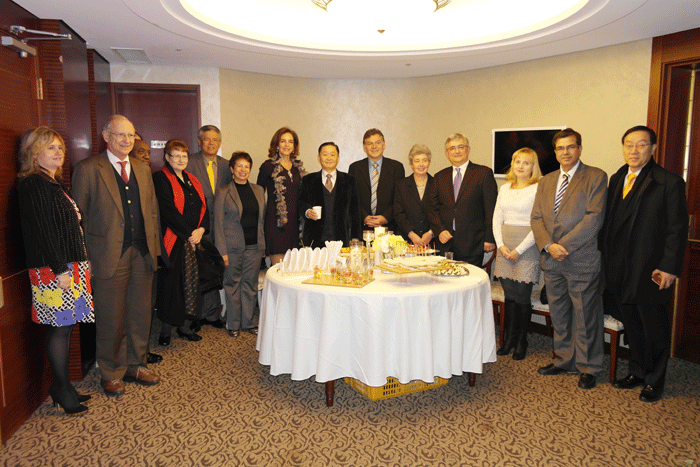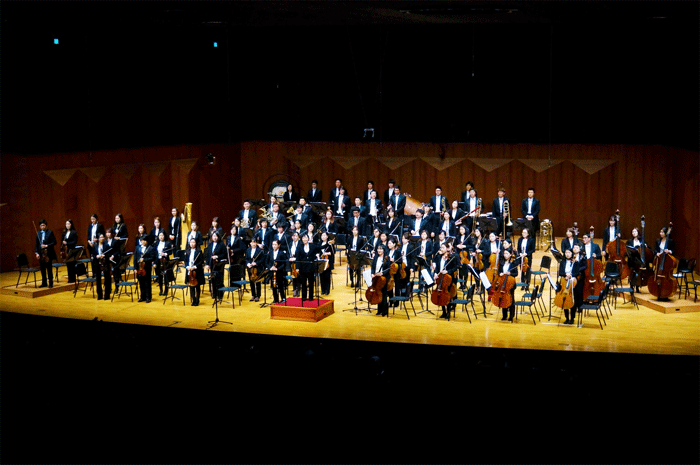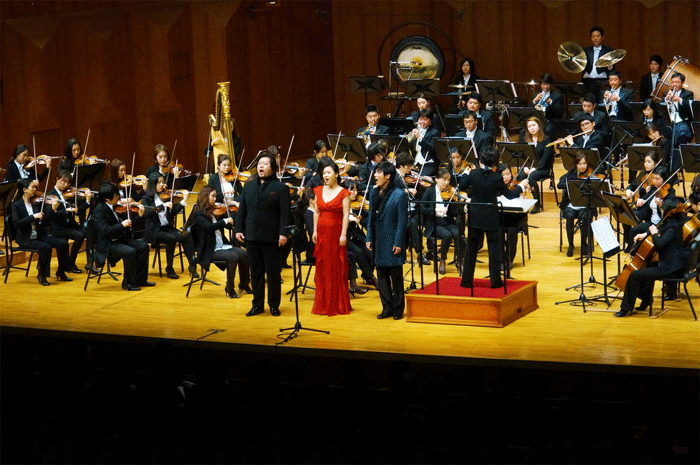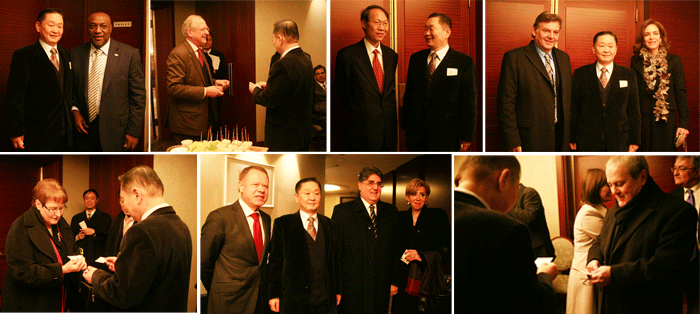Hosted by Chairman Kang of United Cultural Foundation at Seoul Art Center
Chairman Kang Duk-yung of the United Cultural Foundation (concurrently chairman of the Korea United) hosted a Grand Lunar New Year Family Concert by the United Philharmonic Orchestra at the Grand Concert Hall of the Seoul Art Center in Seocho-dong Seoul on Feb. 11, 2014. It was attended by a total of nearly 40 ambassadors and madams and other senior diplomats and an estimated 2,000 distinguished guests such as leaders of the government, stock-market and financial circles, mass communications media, hospitals and pharmaceutical companies and various other business organizations.
Greeting the ambassadors and their spouses, Chairman Kang said that the cold winter has now gone and a warm spring is in the offing readying to come at any time and that he invited the distinguished guests to the Concert to forget the low temperatures of the winter with the warm melodies of the concert. Then he expressed hopes that the Korean and international guests will take home the new energy from the Concert and expressed his deep appreciation for the distinguished Korean and foreign dignitaries kindly attending the Concert.
The Concert featured Conductor Ms. Kim Bong-mi, Soprano Ms. Kim Hye-jeong, Tenor Yoon Byung-gil and Countertenor Luis Choi.

L. Bemstein (1918 to 1990), Glitter and Be Gay from Operetta Candide (Soprano Ms. Kang Hye-jung);
F. Handel (1685 to 1759), Lascla Ch’lo Planga from Opera Rinaldo (Counter Tenor Luis Choi);
L. Delibes (1836 to 1891, Flower Duet from Opera Lakme (Duet of Soprano Ms. Kang Hye-jung and Luis);
G. Puccini (1858 to 1924), Nessun Dorma from Opera Turandot (Tenor Yoon Byung-gil); and
Im Geung-soo, Like Spring Comes from Yonder the River (Kang Hye-jung, Yoon Byung-gil and Luis Choi).
After a 15-minute intermission, there were: N. Rimsky-Korsakov (1844 to 1908), Symphonic Suite ‘Scheherazade’, Op. 35, which consisted of ‘The Sea and Sinbad’s Ship,’ ‘ The Story of Prince Kalendar,’ ‘The Young Prince and Princess’ and the ‘Festival of the Baghdad.’
Before the presentation of each work, Conductor Ms. Kim presented a brief summary, which helped full appreciation of the performance by the guests. Here are the some of the explanations given by Conductor Kim:

'Celesta Aida’ from Opera Aida:
Most of the operas are on the theme of Love. Verdi’s opera, Aida, too, features the love between the general and the princess of Egypt and also with the princess of Ethiopia who has become a slave. For us, it is well known for its march of triumph.
Juliet’s Waltz from Charles Gounod’s opera, Romeo and Juliet:
Many noted composers have written music based on Romeo and Juliet of William Shakespeare, including Peter Tchaikovsky, Sergey Prokofiev, Leonard Bernstein and Hector Berlioz. However, Charles Gounod is known to have written most faithfully to the original.
Juliet’s Waltz shows Juliet almost totally uninterested in the young man arranged by the two families at a party. Instead, she expresses her wish that she could continue to have her fill of joy and bliss she’s been having before his appearance.
Lascha ch'io pianga by Countertenor Luis Choi: Flower song in Duett.
Countertenor is a male vocalist who has the voice of a woman. A countertenor presents the lower register of a woman vocalist, namely the range of alto, which is not strange to our ears thanks to the movie, Farinelli the Castrato. In the past, women were not allowed to sing in the palace or church and therefore boys were castrated before the break of their voice so that they could sing in the voice of a woman. They were called a castrato. This is no longer practiced today as there are men who can cover the low range of voice of a woman without such a surgery. They are called countertenors.
Nessun dorma (Soprano Kang Hye-jeong, Tenor Yoon Byung-gil, Countertenor Luis Choi): Like spring coming from across the river
Nessun Dorma here means that no one is going to sleep. Princess Turandot sets three puzzles. Notices are pasted on the walls saying, “Whoever solves all three puzzles will marry with me. However, he who fails to do so will get a death penalty.”
Wise Prince Khalaf bravely challenges the puzzles and solves all of them.
However, Princess Turandot refuses to marry him. Prince Khalaf counterproposes to Princess Turandot, “Princess, please find my correct name before tomorrow. If you find name, I will gladly die for you. However, if you do not find my name, you have to marry me.
The princess sends out people to all places to find out his name.
The day dawns and the princess cries out to her people “Nessun Dorma” (never go to sleep) before you find out his name.
However, on the other side Prince Khalaf wears a triumphal smile and says, “You will never find out my name.” Then he sings Vincero, the song of victory.

Conductor Ms. Kim, Soprano Kim, Tenor Yoon and Counter-Tenor Choi all got warm applause and big hand from the audience after
each performance.
The audience requested encores with enthusiastic applause, but, due to the limited time, the requests were not fully met. The conductor appeared again and responded with thanks to the warm, big hand.


